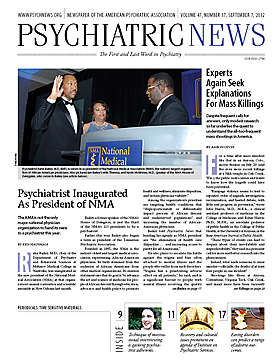Models of “collaborative chronic care” can improve mental and physical outcomes for individuals with psychiatric disorders across a wide variety of care settings, and they provide a robust clinical and policy framework for care integration, according to a meta-analysis published July 12 in AJP in Advance.
Investigators performing a literature search found 161 analyses from 57 trials involving care of a mental disorder (depression, n=40; bipolar disorder, n=4; anxiety disorders, n=3; multiple/other disorders, n=10). The meta-analysis indicated significant effects across disorders and care settings for depression as well as for mental and physical quality of life and social-role function.
Moreover, total health care costs did not differ between collaborative-care models and comparison models.
The report was titled “Comparative Effectiveness of Collaborative Chronic Care Models for Mental Health Conditions Across Primary, Specialty, and Behavioral Health Care Settings: Systematic Review and Meta-Analysis.” The analysis was conducted by Emily Woltman, Ph.D., of the Brown School of Social Work at Washington University, and colleagues.
Collaborative care—also known as “integrated care”—is a feature of the delivery-system reforms in the new health care reform law, and policymakers and many clinicians have converged on the idea that the full range of medical services should be brought together in patient-centered locations. Integrated care was the theme of immediate past APA President John Oldham, M.D.’s presidential year. And today, a small but dedicated cadre of psychiatrists is advancing the cause of integrated care and the participation of psychiatrists in collaborative-care models (Psychiatric News, October 21, 2011).
Integrated-care models have evolved from the traditional consultative role that consultation-liaison psychiatrists have practiced, to a “co-located” model in which psychiatrists see individual patients in a primary care clinic, to a fully collaborative care model in which a psychiatrist takes responsibility for a caseload of primary care patients and works closely with primary care clinicians and other primary care–based mental health care providers. Though models may differ, the core principles of collaborative care are constant: patient-centered care teams providing evidence-based treatments to a defined population of patients using a measurement-based “treat-to-target” approach. (The latter refers to the use of tested instruments so that symptoms can be measured with numerical targets established for clinical treatment goals.)
In the
AJP in Advance analysis, randomized, controlled trials comparing collaborative-care models (CCMs) with other care conditions, published or in press by August 15, 2011, were identified in a literature search and through contact with investigators. CCMs were defined as interventions with at least three of the six components of the Improving Chronic Illness Care initiative developed by the Robert Wood Johnson Foundation. Those components include patient self-management support, clinical information systems, delivery-system redesign, decision support, organizational support, and community resource linkages. (Details about the initiative are posed at
www.improvingchroniccare.org/ .)
Articles were included if the CCM effect on mental health symptoms or mental quality of life was reported. Data extraction included analyses of these outcomes plus social-role function, physical and overall quality of life, and costs.
An example of a trial of collaborative care that was included in the analysis was a report titled “Collaborative Care Management of Late-Life Depression in the Primary Care Setting: A Randomized, Controlled Trial,” which appeared in the Journal of the American Medical Association (December 11, 2002).
In that trial, patients were randomly assigned to a collaborative-care intervention or to usual care. Patients had access for up to 12 months to a depression care manager who was supervised by a psychiatrist and a primary care expert. Services included education, care management, and support of antidepressant management or a brief psychotherapy. The report found that at 12 months, intervention patients had a significantly greater reduction in depressive symptoms from baseline compared with usual-care participants. Intervention patients also experienced greater rates of depression treatment, more satisfaction with depression care, lower depression severity, less functional impairment, and greater quality of life.
Woltman and colleagues said that the analysis demonstrates the cost-effectiveness and outcome-enhancing utility of chronic-care models. “CCM effects were robust across populations, settings, and outcome domains, achieving effects at little or no net treatment costs,” they wrote. “Thus, CCMs provide a framework of broad applicability for management of a variety of mental health conditions across a wide range of treatment settings, as they do for chronic medical illnesses.”

